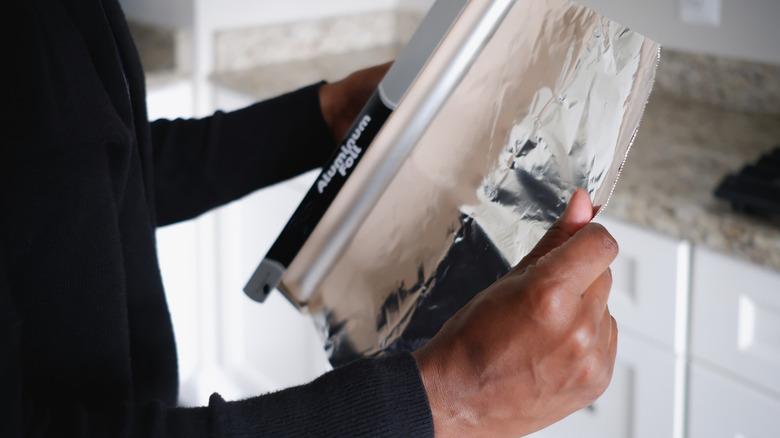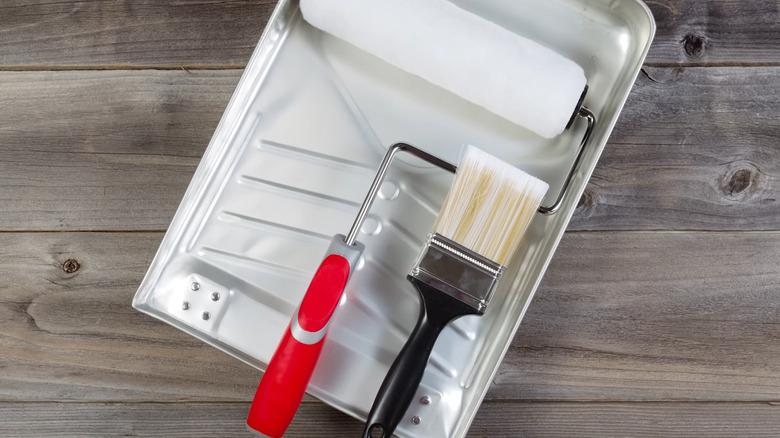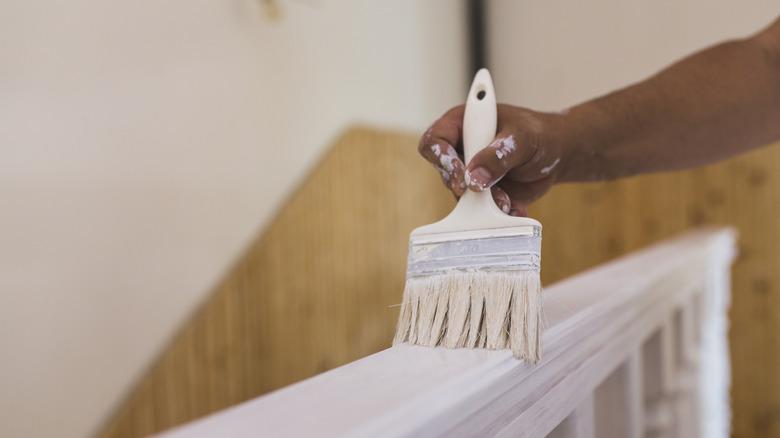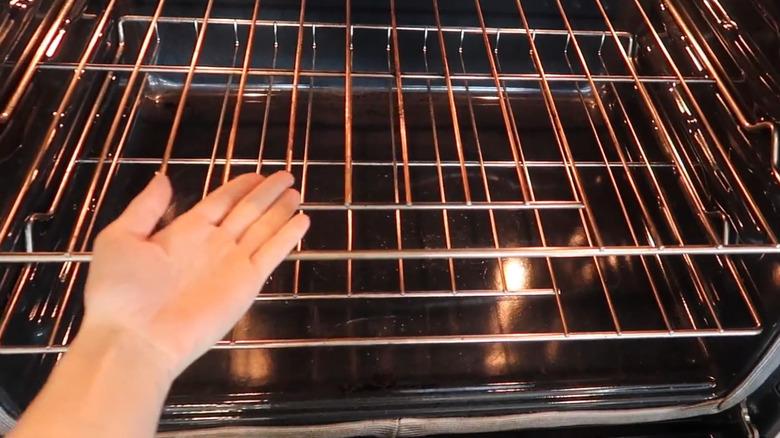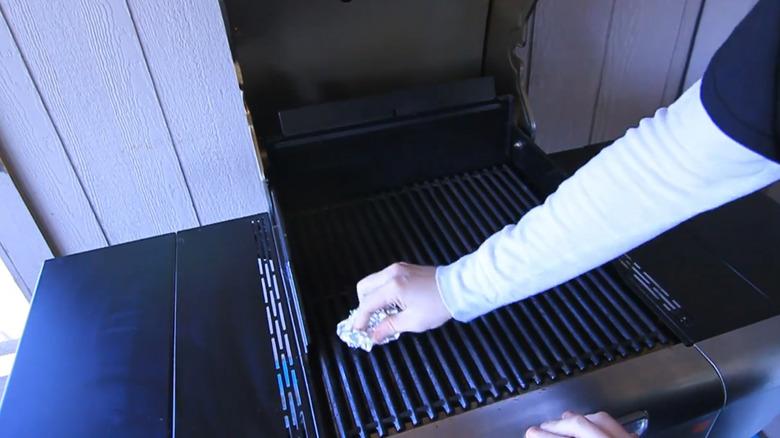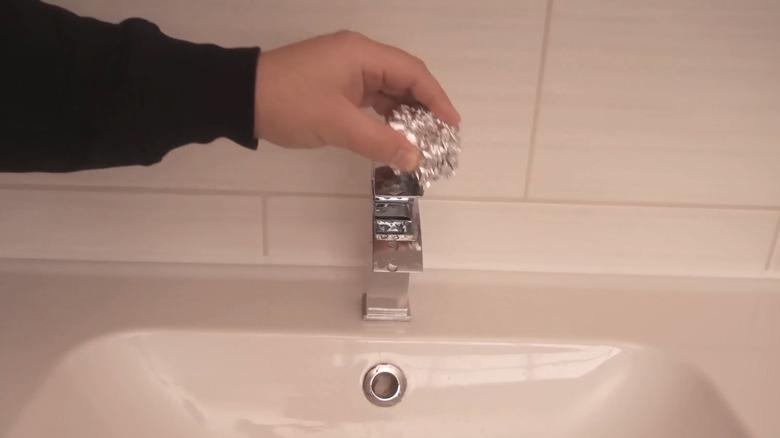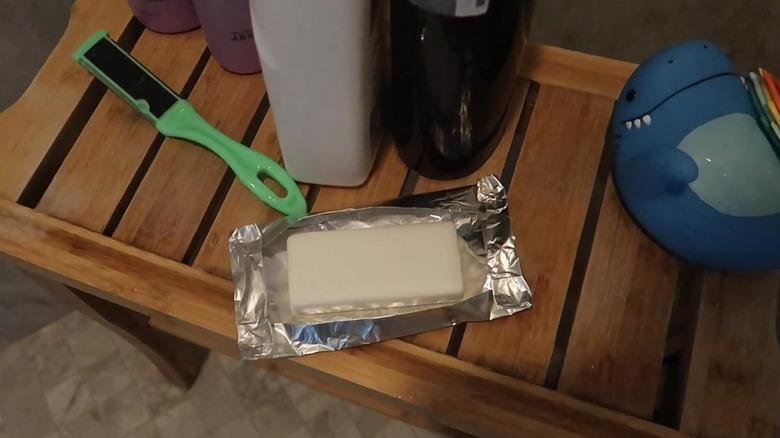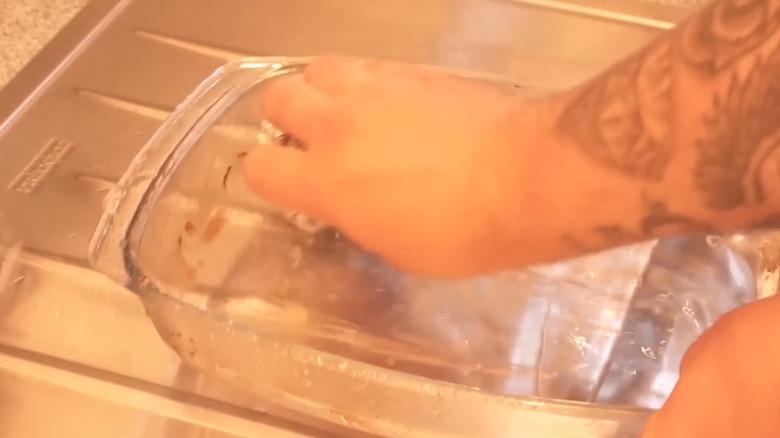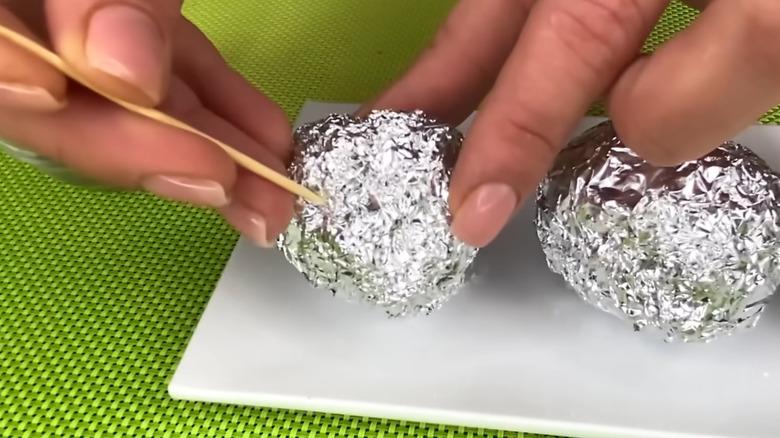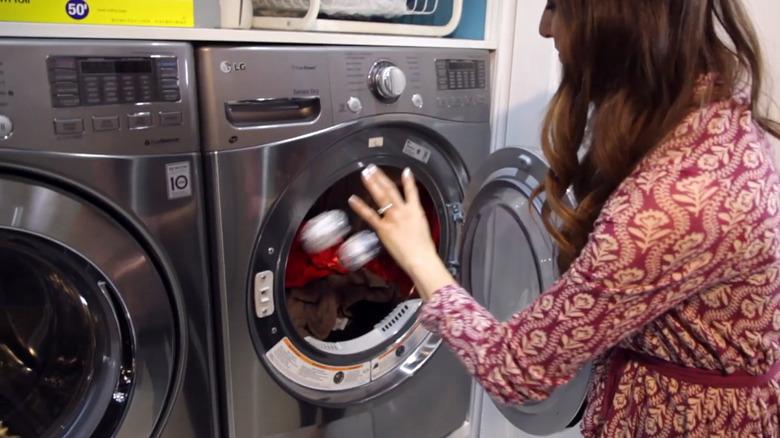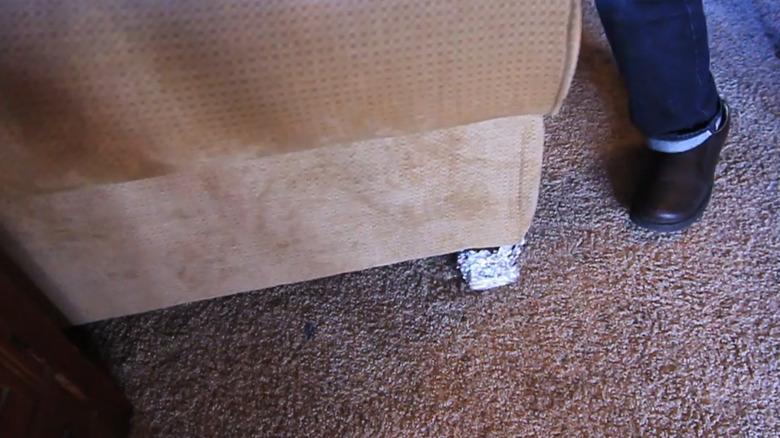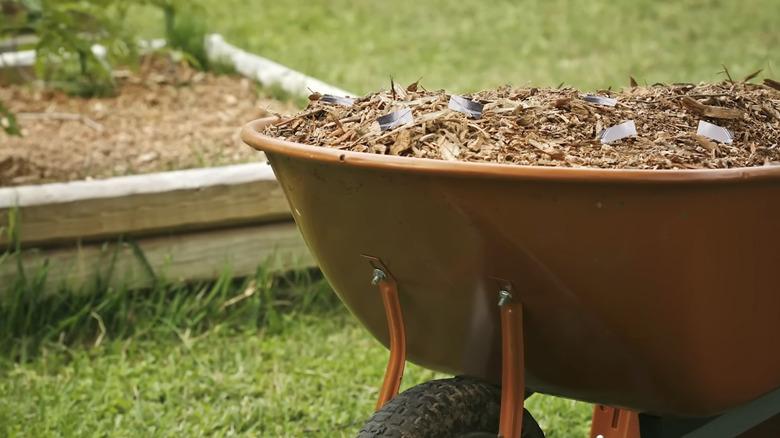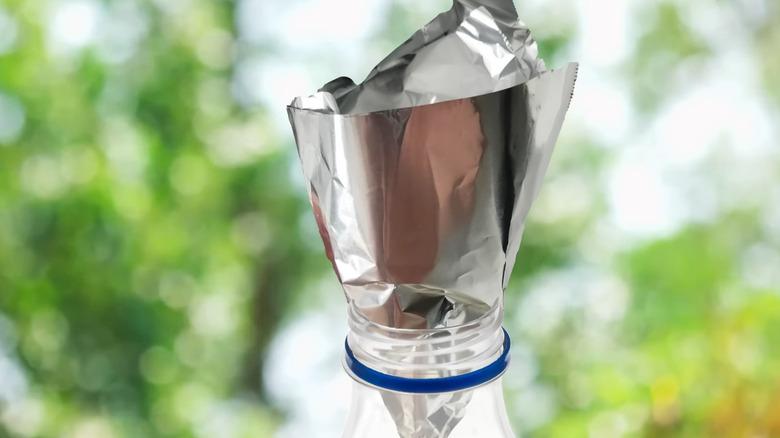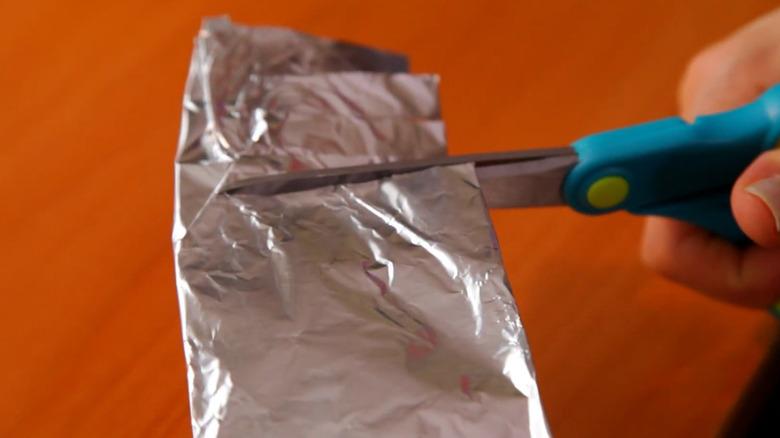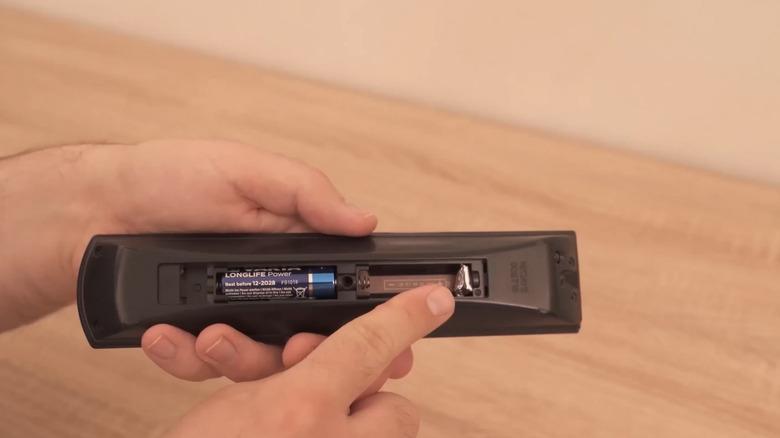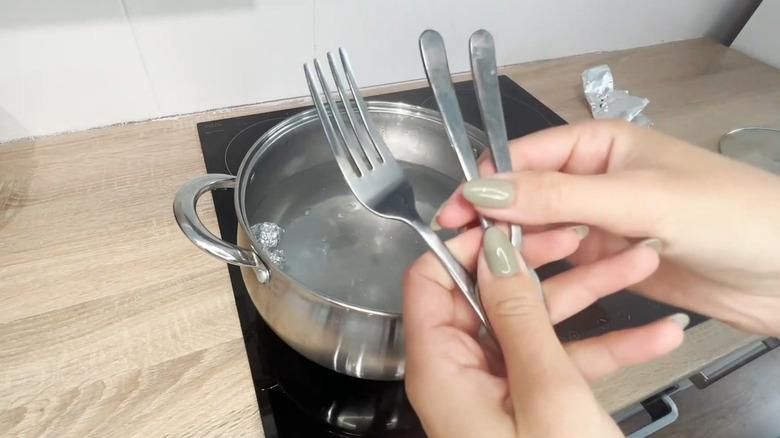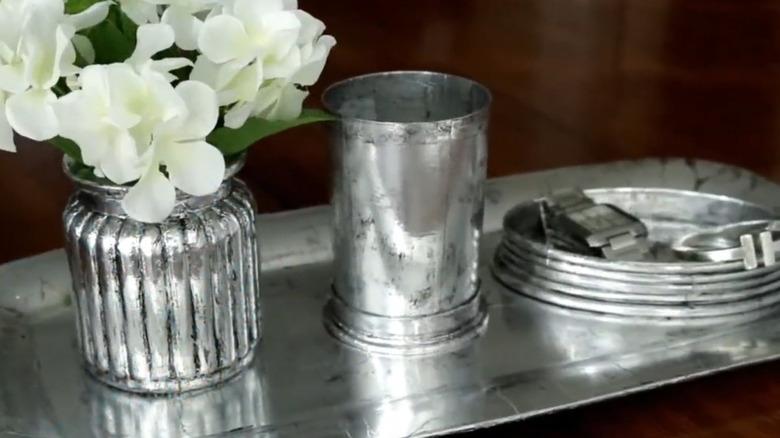18 Genius Aluminum Foil Home Hacks You Should Know About
Standard household aluminum foil is thinner than a human hair, yet it manages to be impervious to gases, light, and moisture. It reflects light and heat, and conducts heat and electricity well. It's sterile until you start messing with it, which can involve forming it into just about any shape because of its extreme malleability. And it resists corrosion by pre-corroding itself with a layer of aluminum oxide you can't perceive. So the surprise isn't that we use it for all manner of things around the house, but that we don't use it more often.
From keeping and making things clean, from scattering light to concentrating poured liquids, we've mined some of the handiest household hacks foil can be used for. Whether you're an inventive DIYer or just trying to get through a normal day at home, aluminum foil has your back. And we're not even scratching the surface (and neither will your foil!). As you read through these hacks, think about how you can extend them. If you can shape foil into a funnel, why not a DIY disposable hose? If it catches grease drips in the kitchen, why not in the garage? You see where we're going.
Line paint roller pans
We often think of aluminum foil as a tool for covering and protecting things, so let's start there. Among the many things you can mold foil to are those expensive, supposedly disposable trays you use to load up a roller with when you're painting. If you cover the tray with foil before pouring in the paint, cleanup will be a breeze, and you can reuse the tray itself almost infinitely.
Keep wet paintbrushes cleanable
If it's frustrating to throw away a paint roller tray because it has dry, crusty paint on it, how much more frustrating is it to throw away a good paint brush for the same reason? You get busy cleaning up and leave a brush somewhere out of sight and mind, only to find it later stiffened by a dry coating of dead salmon latex. The solution? Wrap the brush in foil and stick it in the freezer as soon as you're done painting. After a quick thaw, you can clean it later.
Catch oven drips
This one's pretty obvious, and you might even do it already, but there's always room for improvement. To keep your oven clean from the various drips and drops, line the racks with foil rather than the oven's bottom. That way, you'll keep both the bottom and the racks themselves spotless. Your mileage might vary with convection ovens, so as always, read your owner's manual before you act. But for a conventional oven, this trick is a no-brainer.
Cooking grease disposal
Think fast: What are you cooking that's producing grease that's solid at room temperature, makes an unholy mess, and is always a challenge to dispose of, but you cook and eat it anyway? Bacon, of course. Deal with bacon drips by making a little tub of foil and pouring the warm grease into it. Once the grease solidifies, ball it up and toss it in the garbage.
Clean your grill with a ball of foil
Sometimes you can't use foil to proactively deal with potential messes, and you have to clean actual messes themselves. Aluminum foil can often help with this, too. The most common use of foil as a cleaning implement might be using it to clean a grill. The aluminum is just soft enough to scour a grill or oven grate without damaging it, but is strong enough to remove just about any mess with minimal effort. In fact, aluminum foil is a good choice for cleaning your oven in general.
Remove lime stains from bathroom hardware
The same qualities of soft-but-solid that make foil great for cleaning a grill also help it work to remove hard water stains from metal faucets and fixtures in your bathroom and kitchen. Just use a ball of foil to lightly scrub the lime stains away. Rinse, repeat as necessary. As always, test an inconspicuous area before you go all out with this improvised scrubby. Some surfaces might be damaged by the foil.
Improvised soap dish
From tub scum to liquid soap drips, clean things can also make your house dirty. This trick isn't going to win you any coverage in Unrealistic Homes magazine, but from time to time, you might have reason to protect your sink or tub from the inevitable much left behind by a wet bar of soap. Simply fashion a disposable soap dish from foil, use it while you must, then toss it when the reason for the bar soap (a guest or poison ivy, perhaps) is gone.
Clean casserole dish, pots, and pans
When you're confident its surface can handle the abrasiveness, nothing beats a ball of foil for cleaning the baked-on, burnt-on, or otherwise semi-permanently bonded mess that eventually finds its way on or in every casserole dish, pot, and pan in your kitchen. Scrub the carbonized catastrophe with a ball of foil and watch the stains fade away. Eventually. Obviously, anything with a nonstick coating that might be fragile should be cleaned according to manufacturer's directions, especially when it comes to using abrasives.
Clean the toilet with aluminum balls
It isn't what you think. While scrubbing grills with a ball of foil might be smart, it's no way to clean toilets. Instead, foil can help you gently and chemically deal with the various nasties that find their way into your toilet. Mash together grated bar soap, baking soda, and toothpaste, then wrap it in a ball of aluminum foil. Poke some holes in the foil and drop it in the tank of your toilet for gentle, slow-release cleaning action. But note that there are some downsides to putting foil in your toilet.
Get rid of dryer static
There are a lot of useful dryer hacks out there, featuring everything from ice cubes to tennis balls. But an aluminum foil hack for removing static? Of course! A baseball-sized foil ball will discharge the static from every piece of your laundry, and keep 'em separated so they dry faster. Reuse the balls as often as you want; it goes down the same as the thousand before.
Speed up ironing
What's next after drying clothes? For most people, you put them on and go to work, but a vanishing species of hyper-vigilant natural fiber fans still apply an iron to their clothes. This possibly medieval practice involves applying a hot, flat metal implement to your clothes until they admit their heresies or emerge free of wrinkles. Lining your ironing board with foil helps the ironing process to heat fabrics from both sides, speeding up the torture ... err, that is, the process.
Make furniture slide smoothly
Less fastidious, less easily satisfied Americans use the time they save by not ironing clothes to endlessly move furniture around in search of the ever-elusive perfect organization of space. It's not always so easy, though, as furniture legs are sometimes made of materials with the curious property of infinite friction. But a little pad of foil under the feet will make them easy to slide around, possibly to cover the burnt spot where you accidentally left your iron for an entire day.
Protect your vegetable garden
This one is pure genius (although possibly evil genius). This hack has many upsides and maybe a few meaningful downsides as well. The idea here is to add strips of aluminum foil to your garden mulch or compost, or mix it directly with the soil. This does a couple of cool things, like reflecting sunlight up to the undersides of leaves for more vigorous growth. It can also reduce evaporation and deter certain pests. But it might leach aluminum into the ground, which may or may not be something you're in favor of. One thing to keep in mind is that aluminum foil is generally not considered environmentally friendly, so please chat with a master gardener before using this hack.
Improvise a funnel
There are a lot of ways to cope with a situation in which you need a funnel but don't have one. The most common seems to be to pour the liquid all over the place in a fit of unrealistic optimism. You can also try to fashion one from a soda bottle or, if you're quite mad, 3D-print one. But by far the easiest and most effective is to form a temporary funnel from aluminum foil, which is immensely malleable and even more disposable.
Caring for those scissors
Counter-intuitive hacks are often the most interesting. Planning to procrastinate, for example, or not trying to fall asleep (so the stress of insomnia doesn't keep you awake) are good examples. But the most common and least understandable might be sharpening scissors by cutting through a few folds of foil six or eight times. The best part is that it doesn't actually work; rather than sharpening your scissors, it cleans them and deburrs the edge, much in the same way that honing a knife blade sharpens without sharpening. What does not kill your scissors apparently makes them stronger.
Make batteries fit, or replace them
This is a common hack, and can be a pretty bad idea if not done with care. We include it here to encourage you to take such actions with care. Because aluminum conducts electricity so well, it can be carefully used as an extender so that shorter batteries can be used (say, AAA in place of AA) in an emergency. When a device uses multiple batteries in parallel or when voltage isn't critical (some remote controls fit the bill), you can often replace a missing battery with a thick strip of foil that's well-secured.
Polish silverware and jewelry
Aluminum foil hacks are surprisingly light on chemistry know-how, but this one is different. Removing tarnish (silver sulfide) from silverware and jewelry can be accomplished with hot water and foil, ideally with the help of baking soda. The baking soda improves the conductivity of the water, while the foil causes an electrolytic reaction that transfers the tarnish molecules from the silver to the foil itself.
Give plastic trays etc. an antique silver look
We've saved the best for last. At one time, a "faux finish" was an attempt to paint a wall or some cheap piece of furniture so that it looked ridiculously out of place in your normal middle-class home. It never worked, and thank goodness for that, because who has a marble wall in their 1960s ranch? But YouTuber Modus Style (@modusstyle1478) manages to use foil, some black paint, and a few other goodies to give plastic trays and other pieces a super-realistic-looking antique silver patina. You won't believe how well this works.
